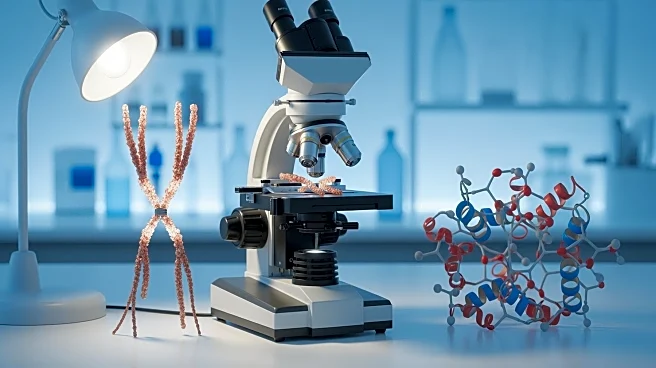What's Happening?
BioTechniques Editor-in-Chief Michelle Itano has highlighted three significant articles from the journal's recent issues, focusing on advancements in chromosome preparation and protein interaction studies. One study presents an optimized protocol for
preparing chromosomes from the HeLa cell line, which could enhance cytogenetic analysis by increasing chromosome yield. Another study explores the use of the LexA-E. coli two-hybrid system to study human protein interactions, specifically between Prostate Apoptosis Response-4 and Glucose-Regulated Protein 78, offering a cost-effective alternative to eukaryotic systems. Additionally, a new protocol for non-destructive DNA extraction from small organisms preserved in DESS is introduced, facilitating DNA barcoding without damaging specimens.
Why It's Important?
These studies represent significant advancements in molecular biology and genetics, with potential applications in clinical diagnostics and research. The optimized chromosome preparation method could improve the efficiency of cytogenetic analyses, crucial for understanding genetic disorders. The LexA-E. coli system's application in human protein interaction studies provides a low-cost, efficient alternative for research in resource-limited settings, potentially accelerating discoveries in cancer research. The non-destructive DNA extraction protocol could revolutionize taxonomic and ecological studies by allowing DNA barcoding without specimen damage, broadening the scope of biodiversity research.
What's Next?
The implications of these studies suggest further research and development in these areas. The chromosome preparation protocol may be adapted for other cell lines, enhancing its utility across various research fields. The LexA-E. coli system could be expanded to study other protein interactions, potentially leading to new insights in disease mechanisms. The non-destructive DNA extraction method may be refined and applied to a wider range of organisms, supporting more comprehensive ecological and taxonomic studies.
Beyond the Headlines
These advancements highlight the ongoing innovation in molecular biology techniques, emphasizing the importance of developing cost-effective and efficient methods for research. The ability to conduct high-quality research in resource-limited environments could democratize scientific discovery, allowing more institutions to contribute to global knowledge. Furthermore, these methods may lead to ethical considerations regarding the preservation of biological specimens and the potential for broader ecological impacts.
















